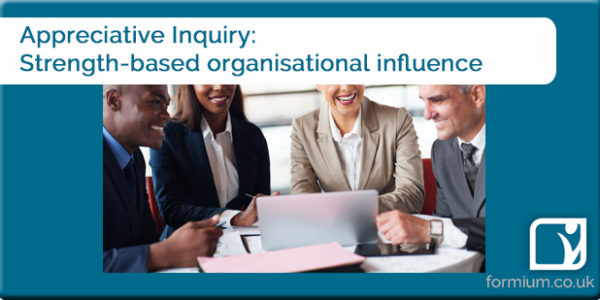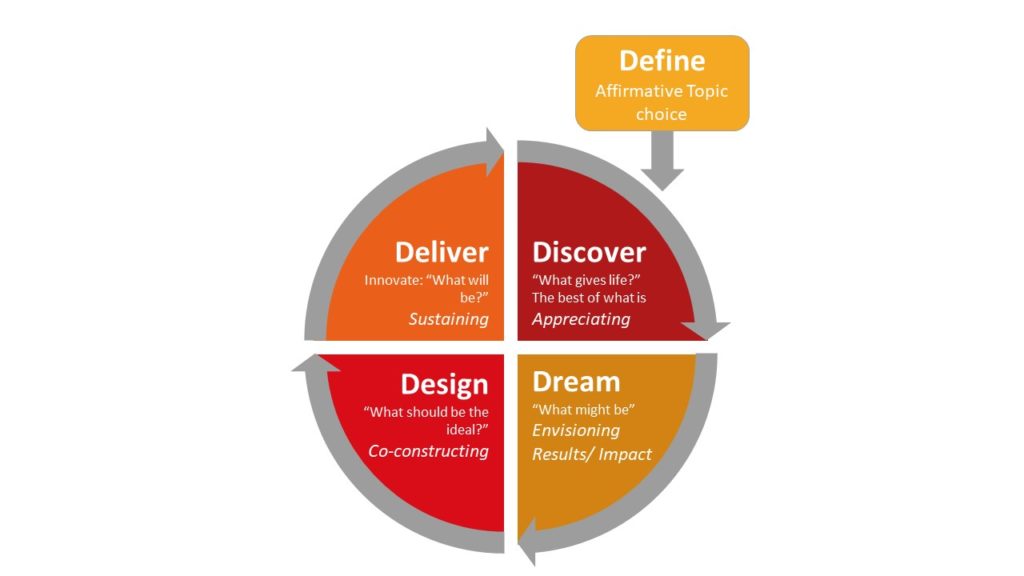We’ve all been there. You are tasked with delivering a significant change to processes, products or ways of working. Before you even start you are told by colleagues or staff that this will never happen, it’s impossible to do and all you feel is push-back.
Leading change can feel like pushing a boulder up a hill with the risk that it will roll right back down at any moment.
I’m sure this sounds familiar, as it is derived from two commonplace issues – that people often fear change and resist it, and that most organisations introduce changes by focussing on existing problems and shortcomings, such as John Kotter’s famous ‘melting iceberg’.
But what comes of this approach? A negative atmosphere as everyone tries to dodge responsibility, and you impose a top-down change that will hopefully fix the problem. And how many times do you fix one problem only to find that you’ve now created another? Or find that people resist adopting your solution at all?
If you think about how we apply the idea of strengths for a person – that you can deliver better change and growth by harnessing strengths rather than focussing on weaknesses – then you can imagine there is a similar approach for teams and organisations.
Appreciative Inquiry (AI) is that approach – it focuses on finding out what already works, and how to leverage those successes and strengths. It is a collaborative approach, because unless you have everyone involved, you can’t effectively incorporate the multiplicity of perspectives. By co-creating a vision as well as the approach together, you’ll reduce resistance to change and have a more effective and lasting solution.
The theory and research underpinning Appreciative Inquiry (AI) is extensive, as is the track record of AI being used effectively in a whole host of settings across industries, countries and sectors.
The Appreciative Inquiry process starts with a positively stated topic choice or inquiry question, such as: “How can we deliver maximum value for our customers within our existing resources?” or “Creating innovation through collaboration with other departments or organisations” or “Becoming a high performing and fun team.” Its power comes from the combination of focusing on what works and approaching changes with an open, enquiring mind.
The AI process then uses a simple 4D model to address the topic – Discover – Dream – Design – Deliver
This may not seem that different from a range of other such models, until you look at what happens in each phase.
Traditionally managers would use root cause analysis to try and understand problems. In Appreciative Inquiry, this phase is about looking positively at what is already working, helping us identify the key ingredients of success for this team or organisation. It embraces the positive traditions and stories that they have about themselves.
Looking at existing success helps engagement and creativity and generates confidence for the next stage. You may find those existing examples of collaboration or of innovation that can act as the template for wider improvements.
Rather than the narrow focus on solving problems with the minimum effort in the minimum time, this visioning phase is about using the positivity so everyone feels safe in challenging the status quo, in thinking about the big picture, and creating a vision that reaches into the future.
We ask questions like “How does our version of excellence on a budget look, and crucially why does it matter?”
When you’re grounded in what’s worked, and because you’re involving everyone, you can build a compelling dream that generates commitment to action.
The Appreciative Inquiry approach is to focus on bridging the gap to your dream, while making sure there is alignment with values, strategy, structures and processes.
Co-creation means working with all involved, which ensures that you don’t ‘rob Peter to pay Paul,’ and generates crucial buy-in and joint-ownership of change.
This stage is when you work together to translate the vision into action plans and share roles and responsibilities in making it happen.
You’ll need to maintain the momentum – keep talking together, challenging each other, reaffirming commitment to change.
Agree how you will hold each participant accountable for delivering their commitments, but don’t fall back into negativity and top-down power.
Reflect back on what you’ve learned about the traditions and stories people tell about themselves, and use them to overcome any obstacles. Continue to celebrate successes.
Appreciative Inquiry is effective
As an external facilitator who has used an Appreciative Inquiry approach with many teams, I can tell you that it works. So many top-down change programmes fail because of the fear, resistance or lack of ownership. With AI, that initial focus on ‘what works already’ gives people security, helps them understand that their particular perspective is valued. This enables them to be creative, to see the big picture and to consider what they individually need to do for the team to reach their compelling vision.
While Appreciative Inquiry works exceptionally well on large-scale change or organisational development programmes, it is not just about externally-driven change or solving specific challenges. Some of my best experiences have been using AI approaches in team away-days to help them reflect, define their own vision and agree how they will act differently in the future, all based on what they were already great at.
Many of my clients use an external facilitator because it helps create a level playing field for all participants, and because we can more easily ask the big questions and identify the ‘we’ve always done it like that’ assumptions. But any manager can learn how to use an AI approach – there’s a wealth of accessible resources to help you – books, websites, videos, webinars.
Eszter Molnar Mills is a strength-based leadership and organisation development specialist.
She helps organisations and individuals reach enhanced performance by reflecting on what works, and by developing skills and strategies for improvement.
Through Formium Development, Eszter supports organisations, teams and individuals through consultancy, executive and team coaching, and facilitation.
If you’d like help or advice on implementing the Appreciative Inquiry approach, then please get in touch.





